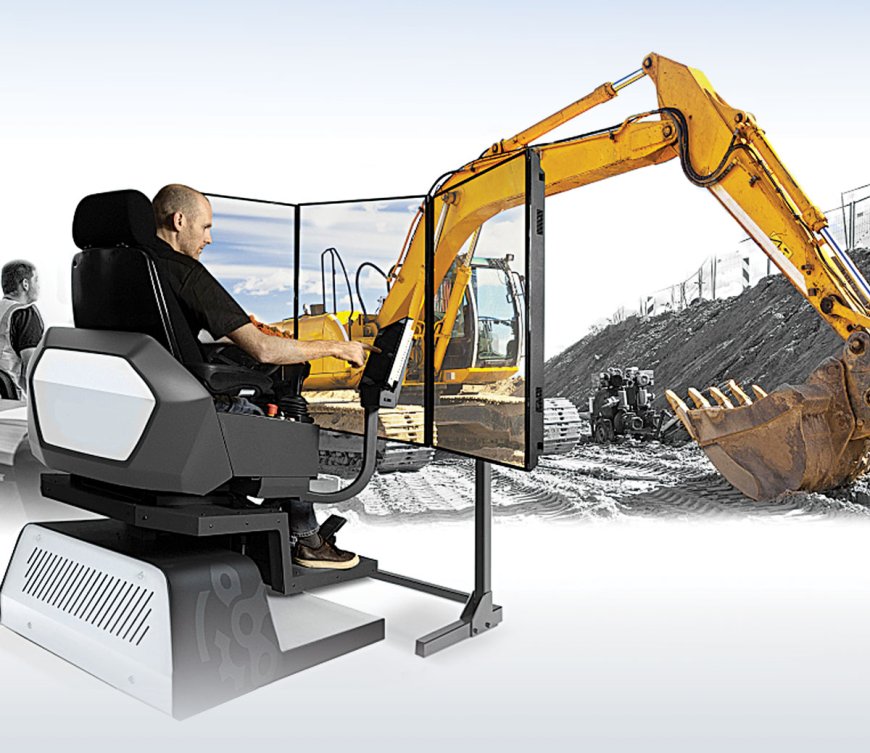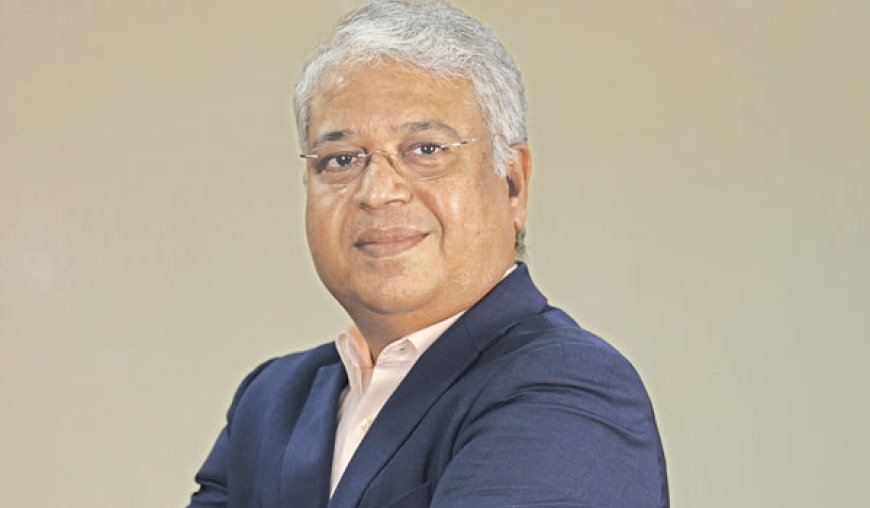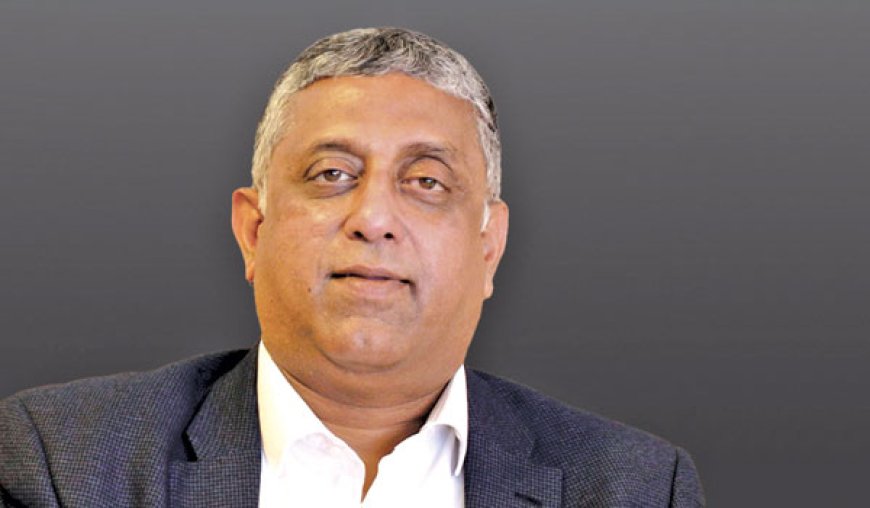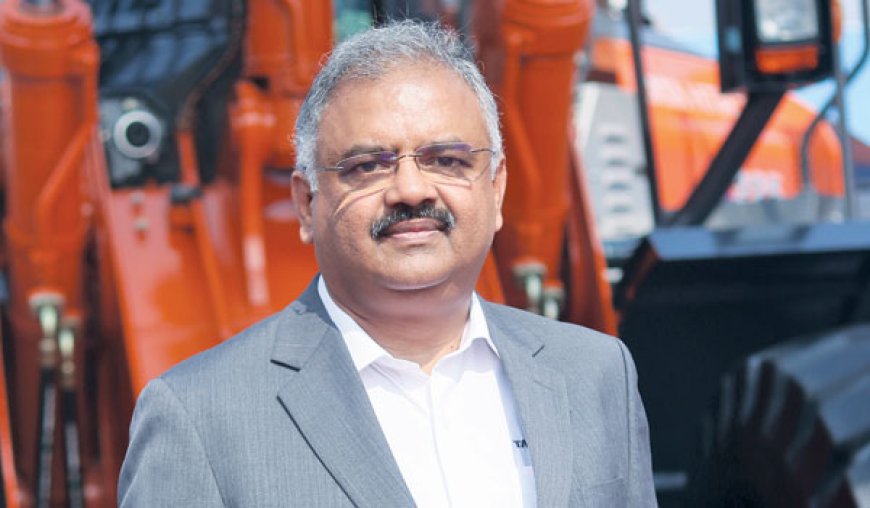SKILLING REIMAGINED
A large part of the business is in the hands of equipment operators. A well trained, skilled and certified heavy equipment and machine operator can play an important role in increasing the profitability.

Equipment Times explores the critical aspects like training initiatives progressing in the country for equipment operators, latest technologies used in the operator training programme, future plans for operator training activities by companies, scarcity of skilled operators affecting the prospects of the industry, and future plans for skilling and training of operators in the construction equipment industry.
A large part of the business is in the hands of equipment operators. A well trained, skilled and certified heavy equipment and machine operator can play an important role in increasing the profitability. Today, the ecosystem has realised the need of right sourcing, assessment, training and certification of the operators.
As construction and other infrastructure building activities in the country flourish, there is a growing need to mobilise and train individuals to fulfill the need for skilled manpower. Ensuring a steady pool of qualified, globally competitive and job-ready workforce for the construction industry will not only ensure high-quality output but also lead to higher employment generation in urban, semi-urban and rural areas, consequently having a multiplier effect on the country’s GDP growth.
Government of India…
While the Indian construction sector has moved from the bullock cart to the bullet train era, skilled workers remain an elusive commodity. The role of skill development/ operator training in CE operations and maintenance, current scenario of availability of skilled/certified equipment operators in India, challenges faced in skill development initiatives and steps needed to bridge the gap of demand-availability of skilled operators are some of the key issues for training and skilling.
The Government of India has taken the Skill India initiative. This segment’s training delivery is quite challenging. The present skill ecosystem needs specially designed a special framework for the heavy equipment operators training. There are more than thousands of training partners working for the Skill India ecosystem. But there are only a few companies who are working for the training of operators.
IESC making its mark…
Over the years, growth in the infrastructure equipment sector has been synonymous with the economic health of the country. In 2010, the sale of construction equipment was around 60,000 units and expected to touch 300,000 units over the next decade. With existing shortage of skilled manpower coupled with this anticipated growth, an overall requirement of nearly two million operators and mechanics was projected.
Realising this futuristic need and with the existing vocational education system being unable to fully support the industry; the Infrastructure Equipment Skill Council (IESC) was formed in 2014 as an apex body to spearhead the skilling of workforce in the sector. IESC established its head office in Bangalore in 2014 and commenced operations with the primary focus on training and certification of operators and mechanics. The Council, promoted by the Indian Construction Equipment Manufacturers Association (ICEMA), is funded partly by contributions from the industry and by the National Skill Development Corporation (NSDC). The IESC works in close coordination with the Confederation of India Industry (CII).
Adopting Changes…
Geared to adopt changes India has been slow in adopting Industry 4.0 technologies and currently faces a serious threat from other countries which are leapfrogging to implement advanced manufacturing solutions. The level of automation in India is low. As per a report by the International Federation of Robotics, in 2014, India had only 1 robot per 10,000 employees in the manufacturing sector. And in 2014, only 2,126 industrial robots were sold in India, accounting for 0.9% of global industrial robot sales.20 with a strong background in IT, India has seen a number of start-ups in the digital technology space. Companies like Imaginarium which provide 3D printing services have come up. Though the current market for 3D printing is small 21, big companies like Hero, L&T, Pidilite and ISRO have used such technologies to develop prototypes. Implementation of such technologies in industry on a large scale is bound to take some more time. In terms of sectors driving Industry 4.0 adoption, the Automotive sector is at the forefront. Some other areas that have seen some traction in adoption of such technologies include packaging in the FMCG sector, service management at hospitals and monitoring in the energy / power sector.22 India faces a significant threat due to shrinking labor cost arbitrage compared to countries like Vietnam, Indonesia, etc. Manufacturers have been looking at other attractive destinations which offer the cost advantage which countries like India have offered historically. With adoption of Industry 4.0, India has an opportunity to turn the tide in its favor as Industry 4.0 will help India in evolving as a hub for manufacturing quality products at low cost when compared to other countries.
Industry leaders up training initiatives…
 Vijay Kumar, CEO, Infrastructure Equipment Skill Council (IESC), said, “IESC has been closely working with all its stakeholders, including OEMs, to help create a robust skilling ecosystem in the CE Industry. Since its inception, IESC has developed ~40 job roles covering >80% of the work force, accredited >60 Training Partners majority of whom are OEMs, certified over 800 trainers and trained over 50,000 personnel. IESC has also partnered with the Government, both at the Center and State level, to impart skill development training and certification for equipment operators and mechanics. For example, under the National Initiative for Promoting Upskilling of Nirman workers (NIPUN) Scheme of Ministry of Housing & Urban Affairs (MoHUA), IESC is training and certifying fresh candidates as well as upskilling experienced personnel under the Recognition of Prior Learning (RPL) program. For the purpose, IESC is expanding its geographical coverage by onboarding new Training partners pan India.”
Vijay Kumar, CEO, Infrastructure Equipment Skill Council (IESC), said, “IESC has been closely working with all its stakeholders, including OEMs, to help create a robust skilling ecosystem in the CE Industry. Since its inception, IESC has developed ~40 job roles covering >80% of the work force, accredited >60 Training Partners majority of whom are OEMs, certified over 800 trainers and trained over 50,000 personnel. IESC has also partnered with the Government, both at the Center and State level, to impart skill development training and certification for equipment operators and mechanics. For example, under the National Initiative for Promoting Upskilling of Nirman workers (NIPUN) Scheme of Ministry of Housing & Urban Affairs (MoHUA), IESC is training and certifying fresh candidates as well as upskilling experienced personnel under the Recognition of Prior Learning (RPL) program. For the purpose, IESC is expanding its geographical coverage by onboarding new Training partners pan India.”
 V. G. Sakthikumar, Managing Director, Schwing Stetter India, said, “The fact that the manpower, especially the migrant workforce had become scarce for production, transportation, placement of concrete, and skilled operators has become a considerable obstacle for the CE industry and its customers especially after the displacement of labour that happened during the pandemic. Our customers prefer a certified skilled operator for all their machines so that the machine functions at optimum level efficiency, whenever it is required. To match the requirements caused by this scarcity, Schwing’s fully dedicated training department has been going strong since 2004 and has been conducting continuous training programs and offering certification of experienced and fresher operators to help our customers to get the maximum output from Schwing machines.”
V. G. Sakthikumar, Managing Director, Schwing Stetter India, said, “The fact that the manpower, especially the migrant workforce had become scarce for production, transportation, placement of concrete, and skilled operators has become a considerable obstacle for the CE industry and its customers especially after the displacement of labour that happened during the pandemic. Our customers prefer a certified skilled operator for all their machines so that the machine functions at optimum level efficiency, whenever it is required. To match the requirements caused by this scarcity, Schwing’s fully dedicated training department has been going strong since 2004 and has been conducting continuous training programs and offering certification of experienced and fresher operators to help our customers to get the maximum output from Schwing machines.”
 Amarnath Ramachandran, Managing Director, Arx Mining and Construction Equipment, says, “If you look at the number of machines entering the market every month, we will get a clear picture of the enormity of the enormity of the task at hand. One of the clear takeaways from these numbers is that it is imperative to start increasing the number of women to operate construction machinery. There are mines in Kalimantan in Borneo where the entire mine has large dump trucks 100 to 240 tonne, all operated by women. Without this, it may not be possible to find enough operators.”
Amarnath Ramachandran, Managing Director, Arx Mining and Construction Equipment, says, “If you look at the number of machines entering the market every month, we will get a clear picture of the enormity of the enormity of the task at hand. One of the clear takeaways from these numbers is that it is imperative to start increasing the number of women to operate construction machinery. There are mines in Kalimantan in Borneo where the entire mine has large dump trucks 100 to 240 tonne, all operated by women. Without this, it may not be possible to find enough operators.”
 According to Alok Jha, Director, Sales & Marketing, India & SAARC, CASE Construction Equipment, said, “At CASE, we invest in the skill development of the worker by providing operator training to enhance the ability to use the machines efficiently. We have recently inaugurated a Skill Development Center – Hunar, to provide a good understanding and training on Loader Backhoe operation. The initiative contributes to the Central Government’s Skill India Mission by training 240 professionals each year. The 1200 sq. ft. facility comprises two classrooms dedicated to theory classes and counselling. The center is located at Sonvai, Rau near Pithampur. The programme is broadly divided into key categories – technical skills, product and process knowledge, health and safety, soft skills grooming, including interpersonal skills, personal management, and work-life sensitivity & life skills.”
According to Alok Jha, Director, Sales & Marketing, India & SAARC, CASE Construction Equipment, said, “At CASE, we invest in the skill development of the worker by providing operator training to enhance the ability to use the machines efficiently. We have recently inaugurated a Skill Development Center – Hunar, to provide a good understanding and training on Loader Backhoe operation. The initiative contributes to the Central Government’s Skill India Mission by training 240 professionals each year. The 1200 sq. ft. facility comprises two classrooms dedicated to theory classes and counselling. The center is located at Sonvai, Rau near Pithampur. The programme is broadly divided into key categories – technical skills, product and process knowledge, health and safety, soft skills grooming, including interpersonal skills, personal management, and work-life sensitivity & life skills.”
 Dheeraj Panda, Chief Operating Officer, Sales, Marketing & Customer Support, Sany Heavy Industry India, said, “We are part of ICEMA and the Infrastructure Equipment Skill Council (IESC) and our training center is also certified by IESC. Some of our senior trainers are also qualified and certified by IESC. We have one training center in Pune and we have kind of built two more. We are in fact in the process of building about five 4S centers across India. One we just inaugurated in Calcutta, we inaugurated one in Ahmedabad recently about a week back, we inaugurated one in Bhubaneshwar and we inaugurated two down south; one in Chennai and one in Vijayapura, Karnataka. All those centers will also have smaller skill development or training centers apart from our main training center which is there in our factory in Chakan. It’s a state-of-the-art training facility with engine training, hydraulical section training, electrical simulation board training and it also has the operator simulation cabins for excavators and cranes. So, these are some things that we do on a regular basis. Predominantly, the training is given to our dealer engineers, our own service engineers in excavators as well as other lines, heavy equipment products also in piling rigs, cranes and port equipment. We also do a lot of customer training. At times, we invite the customer to the factory and carry out the training for three to four days. Alternately, our trainers also travel to various sites. We have crane operators; we have mining truck operators and we have excavator operators. So they go to the site and position themselves on the site for seven to ten days and they are like a part of the customer site team and they run those machines for them. So the dos and don’ts of running those machines, running the machines in the right mode, safety while running those machines and minor or initial maintenances, all those are also taught by these operators. For the machine operators, we have a separate set of training. That is under the IESC guidelines. We train the operators who are kind of new to the operations or who are graduating from smaller machines to larger machines, or in Indian context many of these helpers or people who are kind of associated with the machines for a long time and graduate themselves to the operator level. So, when the operator is away, the helper takes over as the operator on that machine. This typically happens in the retail segment. Those are the kind of operators that we train on a regular basis. We run three to five cycles of operator training. In some of these operator training under IESC guidance, we certify them also. They have an operator training certificate.”
Dheeraj Panda, Chief Operating Officer, Sales, Marketing & Customer Support, Sany Heavy Industry India, said, “We are part of ICEMA and the Infrastructure Equipment Skill Council (IESC) and our training center is also certified by IESC. Some of our senior trainers are also qualified and certified by IESC. We have one training center in Pune and we have kind of built two more. We are in fact in the process of building about five 4S centers across India. One we just inaugurated in Calcutta, we inaugurated one in Ahmedabad recently about a week back, we inaugurated one in Bhubaneshwar and we inaugurated two down south; one in Chennai and one in Vijayapura, Karnataka. All those centers will also have smaller skill development or training centers apart from our main training center which is there in our factory in Chakan. It’s a state-of-the-art training facility with engine training, hydraulical section training, electrical simulation board training and it also has the operator simulation cabins for excavators and cranes. So, these are some things that we do on a regular basis. Predominantly, the training is given to our dealer engineers, our own service engineers in excavators as well as other lines, heavy equipment products also in piling rigs, cranes and port equipment. We also do a lot of customer training. At times, we invite the customer to the factory and carry out the training for three to four days. Alternately, our trainers also travel to various sites. We have crane operators; we have mining truck operators and we have excavator operators. So they go to the site and position themselves on the site for seven to ten days and they are like a part of the customer site team and they run those machines for them. So the dos and don’ts of running those machines, running the machines in the right mode, safety while running those machines and minor or initial maintenances, all those are also taught by these operators. For the machine operators, we have a separate set of training. That is under the IESC guidelines. We train the operators who are kind of new to the operations or who are graduating from smaller machines to larger machines, or in Indian context many of these helpers or people who are kind of associated with the machines for a long time and graduate themselves to the operator level. So, when the operator is away, the helper takes over as the operator on that machine. This typically happens in the retail segment. Those are the kind of operators that we train on a regular basis. We run three to five cycles of operator training. In some of these operator training under IESC guidance, we certify them also. They have an operator training certificate.”
 BKR Prasad, Head, Marketing & Product Development, Tata Hitachi Construction Machinery Company, said, “Being a leader in the Indian CE industry Tata Hitachi initiated an operator training program way back in 2012 with an operator training center housed in the Kharagpur plant. Tata Hitachi has trained and certified over 2000 operators and mechanics in the last two years under the RPL4. Additionally, our training centers in Kharagpur and Dharwad are equipped with simulators, Excavators, Backhoe Loaders, and dedicated trainers. The company trains unemployed youth mobilized by various NGOs as Junior Excavator operators and prepares them to be employed by customers. They undergo a 15-day training at Tata Hitachi’s Training Centers following which they are certified by IESC, post clearing an assessment conducted by an external assessor. Apart from learning to operate the machine, they also learn to carry out basic maintenance of the machine.”
BKR Prasad, Head, Marketing & Product Development, Tata Hitachi Construction Machinery Company, said, “Being a leader in the Indian CE industry Tata Hitachi initiated an operator training program way back in 2012 with an operator training center housed in the Kharagpur plant. Tata Hitachi has trained and certified over 2000 operators and mechanics in the last two years under the RPL4. Additionally, our training centers in Kharagpur and Dharwad are equipped with simulators, Excavators, Backhoe Loaders, and dedicated trainers. The company trains unemployed youth mobilized by various NGOs as Junior Excavator operators and prepares them to be employed by customers. They undergo a 15-day training at Tata Hitachi’s Training Centers following which they are certified by IESC, post clearing an assessment conducted by an external assessor. Apart from learning to operate the machine, they also learn to carry out basic maintenance of the machine.”
 Niti Anand, Human Resource Manager, Dynapac Road Construction Equipment (India), said, “Indian Construction Equipment market is rapidly developing, Highway projects and a growing economy have contributed to a sharp increase in demand for construction equipment in India.
Niti Anand, Human Resource Manager, Dynapac Road Construction Equipment (India), said, “Indian Construction Equipment market is rapidly developing, Highway projects and a growing economy have contributed to a sharp increase in demand for construction equipment in India.
Along with this, strict deadlines are being set for the timely completion of projects. Lack of skilled workers will cause timelines to be delayed and increase the likelihood that output quality and safety will be compromised. Given the ongoing technical updates in CE machines, it is crucial to have a skilled operator who has in-depth knowledge of equipment and their optimal usage.”
Hits: 8








